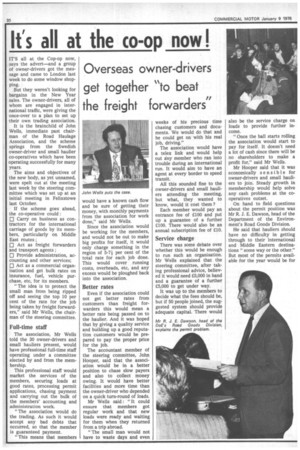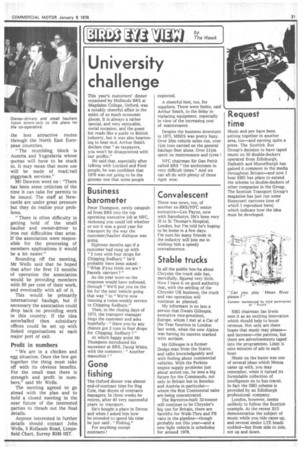It's all at the co-op now !
Page 32

Page 33

If you've noticed an error in this article please click here to report it so we can fix it.
Overseas owner-drivers get together "to beat the freight forwarders"
IT'S all at the Cop-op now, says the advert—and a group of owner-drivers got the message and came to London last week to do some window shopping.
But they weren't looking for bargains in the New Year sales. The owner-drivers, all of whom are engaged in international traffic, were giving the once-over to a plan to set up their own trading association.
It is the brainchild of John Wells, immediate past chairman of the Road Haulage Association, and the scheme springs from the Swedish owner-driver and small haulier co-operatives which have been operating successfully for many years.
The aims and objectives of the new body, as yet unnamed, were spelt out at the meeting last week by the steering committee which was set up at an initial meeting in Felixstowe last October.
If the scheme goes ahead, the co-operative could : EJ Carry on business as contractors for the international carriage of goods by its members, particularly on Middle East routes ; • Act as freight forwarders and transport agents ; O Provide administration, accounting and other services; 0 Act as a commercial organisation and get bulk rates on insurance, fuel, vehicle purchase, etc, for its members.
"The idea is to protect the small man from being ripped off and seeing the top 10 per cent of the rate for the job being taken by freight forwarders," said Mr Wells, the chairman of the steering committee.
Full-time staff
The association, Mr Wells told the 30 owner-drivers and small hauliers present, would have professional full-time staff operating under a committee elected by and from the membership.
This professional staff would market the services of the members, securing loads at good rates, processing permit applications, chasing payment and carrying out the bulk of the members' accounting and administration work.
"The association would do the trading. As such it would accept any bad debts that occurred, so that the member is guaranteed payment.
"This means that members would have a known cash flow and be sure of getting their money, with monthly payments from the association for work done," said Mr Wells.
Since the association would be working for the members, and would not be out to make big profits for itself, it would only charge something in the region of 5-71 per cent of the total rate for each job done. This would cover running costs, overheads, etc, and any excess would be ploughed back into the association.
Better rates
Even if the association could not get better rates from customers than freight forwarders this would mean a better rate being passed on to the haulier. And it was hoped that by giving a quality service and building up a good reputation customers would be prepared to pay the proper price for the job.
The accountant member of the steering committee, John Hooper, said that the association would be in a better position to chase slow payers and also to collect money owing. It would have better facilities and more time than the owner-driver who depended on a quick turn-round of loads.
Mr Wells said : " It could ensure that members got regular work and that new loads were ready and waiting for them when they returned from a trip abroad.
"The small man would not have to waste days and even weeks of his precious time chasing customers and documents. We would do that and he could get on with his real job, driving."
The association would have a telex link and would help out any member who ran into trouble during an international run. It would aim to have an agent at every border to speed transit.
All this sounded fine to the owner-drivers and small hauliers attending the meeting, but what, they wanted to know, would it cost them ?
Each member would pay an entrance fee of £100 and put up a guarantee of a further £100. There would also be an annual subscription fee of £10.
Service charge
There was some debate over whether this would be enough to run such an organisation. Mr Wells explained that the steering committee, after taking professional advice, believed it would need £5,000 in hand and a guarantee of a further £5,000 to get under way.
It was up to the members to decide what the fees should be, but if 50 people joined, the suggested system should provide adequate capital. There would also be the service charge on loads to provide further income.
"Once the ball starts rolling the association would start to pay for itself. It doesn't need a lot of cash since there will be no shareholders to make a profit for," said Mr Wells.
Mr Hooper said that it was economically sensible for owner-drivers and small hauliers to join. Steady growth in membership would help solve any cash problems at the cooperatives outset.
On hand to field questions about the permit position was Mr R. J. E. Dawson, head of the Department of the Environment's Road Goods Division.
He said that hauliers should have no difficulty in getting through to their international and Middle Eastern destinations "some way or the other." But most of the permits available for the year would be for the less attractive routes through the North East European countries.
"The stumbling block is Austria and Yugoslavia whose quotas will have to be stuck to. It may mean that more use will be made of road/rail piggyback services."
Mr Dawson went on : "There has been some criticism of the time it can take for permits to be issued. The staff at Newcastle are under great pressure but they do realise your problems.
" There is often difficulty in getting hold of the small haufier and owner-driver to iron out difficulties that arise. If the association were responsible for the processing of members applications it would be a lot easier."
Rounding off the meeting, Mr Wells said that he hoped that after the first 12 months of operation the association would be providing members with 50 per cent of their work, and eventually with all of it.
This would be primarily international haulage, but if necessary the association could drop back on providing work in this country. If the idea snowballed then subsidiary offices could be set up with linked organisations at each major port of exit.
Profit in numbers
"We are in a chicken and egg situation. Once the few get together the thing must take off with its obvious benefits. For the small man there is strength and profit in numbers," said Mr Wells.
The meeting agreed to go ahead with the plan and to hold a closed meeting in the near future of the interested parties to thrash out the final details.
Anyone interested in further details should contact John Wells, 5 Ridlands Road, Limpsfield Chart, Surrey RH8 OST.




















































































